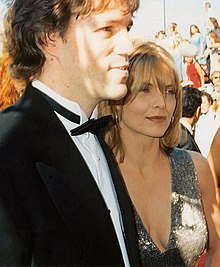David E. Kelley
Kelley is one of very few screenwriters to have created shows that have aired on all four top commercial U.S. television networks (ABC, CBS, Fox, and NBC) as well as cable giant HBO.
[3] Demonstrating early on a creative and quirky bent, in his junior year at Princeton, Kelley submitted a paper for a political science class about John F. Kennedy's plot to kill Fidel Castro, written as a poem.
In 1983, while considering it only a hobby, Kelley began writing a screenplay, a legal thriller, which was optioned in 1986 and later became the Judd Nelson feature film From the Hip in 1987.
"[9] Midway through the sixth season, both Bochco and Kelley were brought in as creative consultants after the show received bad press about its decline in quality.
[11] Its first creation, Picket Fences, airing in 1992 and influenced by Twin Peaks and Northern Exposure,[12] focused on the police department in the fictional quirky town of Rome, Wisconsin.
"[15] Under pressure from CBS to develop a second series even though he didn't feel ready to produce two shows simultaneously,[16] Kelley launched the medical drama Chicago Hope, starring Mandy Patinkin and Adam Arkin, which premiered in 1994.
[17] Airing at the same time as the season's other new medical drama, NBC's ER, the ultimate ratings leader,[18] Chicago Hope plotted "upscale medicine in a high-tech world run by high-priced doctors".
[20] Originally intending to write only the first several episodes in order to return full-time to Picket Fences, Kelley eventually wrote most of the material for both shows, a total of roughly 40 scripts.
Expressing a desire to focus more on his production company and upcoming projects, Kelley ceased day-to-day involvement with both series in 1995, allowing others to write and produce.
[21] Towards the end of the fifth season in 1999, facing cancellation, Kelley fired most of the cast members added since he had left the show, brought back Mandy Patinkin and began writing episodes again.
[24] Premiering as a midseason replacement for the 1996–1997 season, The Practice was Kelley's chance to write another courtroom drama but one focusing on the less-glamorous realities of a small law firm.
Receiving critical applause (along with two Emmys for Outstanding Drama Series) but low ratings in its starting seasons, it eventually became a popular top 10 program.
He responded by firing most of the cast and hiring James Spader for the role of Alan Shore,[29] whom The New York Times described as "a lecherous, twisted antitrust lawyer with a breezy disregard for ethics.
[22] The title character Ally is a young, attractive, impulsive, Harvard-educated lawyer described by a New York Times journalist as "stylish, sexy, smart, opinionated, and an emotional wreck.
"[37] In response, author Erica Jong felt that the Time journalist diminished her argument by using only pop-cultural references and ignoring the majority of real-world women who have made significant progress.
She felt that Kelley treated his female characters "sadistically" in general, beginning all the way back to L.A. Law, saving only The Practice for positive remarks.
The New York Times columnist, Maureen Dowd, quoted two young, professional women saying they liked shows with female characters like themselves, single, even obsessed.
Dowd quoted the executive producer of Law & Order, Dick Wolf, "I think there is a wish-fulfillment factor when you put an attractive woman in a situation where she is doing real, adult stuff.
The TV critic from the Fort Worth Star-Telegram opined that these failures and the weaknesses he saw in Boston Public were a sign that Kelley had lost the Midas touch.
In addition to Snoops, Kelley continued to have a string of unsuccessful series: Girls Club in 2002, The Brotherhood of Poland, New Hampshire in 2003 and the reality show The Law Firm in 2005.
In 2007, Boston Legal began to see a rise of viewership as a result of its following ABC's popular Dancing with the Stars series, mostly ranking either first or second most-watched program of the evening in its ten o'clock time period, beating out CBS and NBC's shows.
Boston Legal aired on four different nights (Sunday, Tuesday, Wednesday and Monday) in its five-season run, with the ratings slipping after each move.
[58] A new medical series, Monday Mornings, co-created with Sanjay Gupta, premiered February 2013 on TNT, the cable television channel owned by Time Warner.
[60] A new comedy series created by Kelley, The Crazy Ones, starring Robin Williams and Sarah Michelle Gellar, premiered on CBS on September 26, 2013.
The series was written by Kelley, who also served as executive producer with Nicole Kidman (who starred alongside Hugh Grant and Donald Sutherland), Per Saari, and Bruna Papandrea.
[68] Kelley served as writer, executive producer and showrunner on The Calling, an American adaptation of Israeli television series Missing File on Peacock.
For example, an episode of Ally McBeal dealt with a female employee who sued for sexual harassment because she noticed that other prettier women were being promoted.
[83] Kelley has incorporated religious subject matter from the beginning, including issues involving Protestantism, Judaism, Scientology and Catholicism among others.
[12] With the widespread media coverage of child sexual abuse cases in the Roman Catholic Church during the mid-to-late 1990s, Kelley began to introduce this controversy into his scripts.
Among the actors and actresses who have won Emmys for playing roles in Kelley's series are Peter MacNicol, Tracey Ullman, Sharon Stone, William Shatner, James Spader, Alfre Woodard, Charles S. Dutton, Michael Emerson, James Whitmore, Beah Richards, Edward Herrmann, Michael Badalucco, Holland Taylor, John Larroquette, Camryn Manheim, Christine Lahti, Héctor Elizondo, Mandy Patinkin, Kathy Baker, Ray Walston, Paul Winfield, Richard Kiley, Fyvush Finkel, Leigh Taylor-Young, Tom Skerritt, Richard Dysart, Paul McCrane, Christian Clemenson, Jimmy Smits, Larry Drake, Nicole Kidman, Alexander Skarsgård, and Laura Dern.
